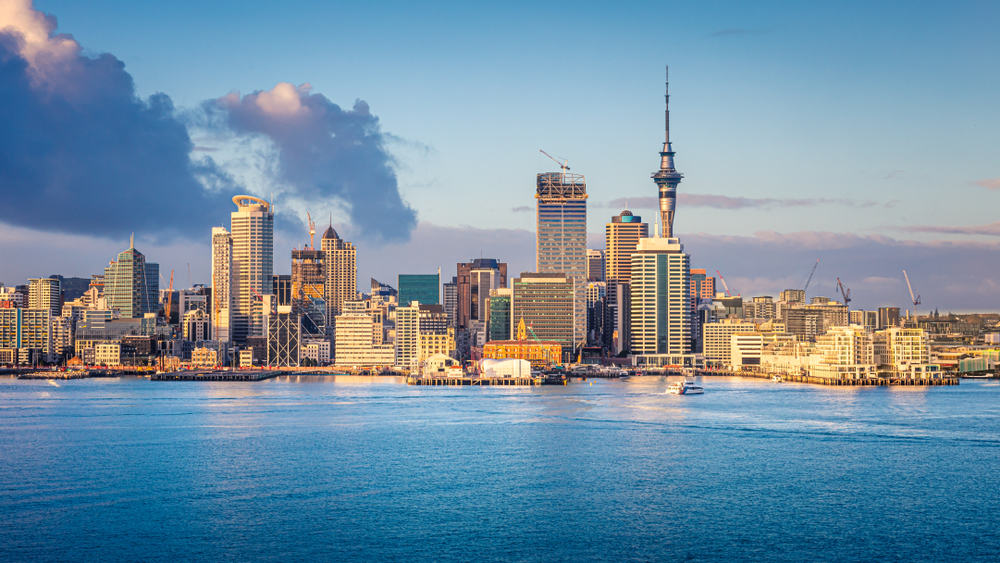
New Zealand is one of the world’s most beautiful countries. Its stunning landscape has been the backdrop of many movies, encouraging people from all over the globe to visit and/or emigrate. New Zealand has excellent healthcare and education systems and actively encourages skilled people to move to its shores.
Investing and starting a company in New Zealand is relatively straight forward. The country also has a need for people in trades, IT, construction, education and every sphere of medicine.
Quick New Zealand Facts:
- Population: 5,127,100 (2022 estimate)
- Official Language:New Zealand has two official languages – English and Maori. The majority of the population are English speaking, but, as a country which is made up of immigrants, many languages are represented here.
- GDP Per Capita:$48,802 per annum
- Landscape: The picturesque landscape of New Zealand makes it one of the most spectacular countries in the world. The dramatic topography, stunning national parks, and the ability to swim in the warmish sea in the morning and ski in the afternoon makes it a very attractive country to live in.
- Currency: New Zealand Dollar (NZ$). As of September 2022, £1 = NZ$0.50, US$1 = NZ$1.73, CAD$1 = NZ$1.28, AUD$1 = NZ$1.13
1. Moving and Shipping Costs to New Zealand
The table below shows international container shipping costs to New Zealand from various other countries around the world.
2. New Zealand Housing Costs
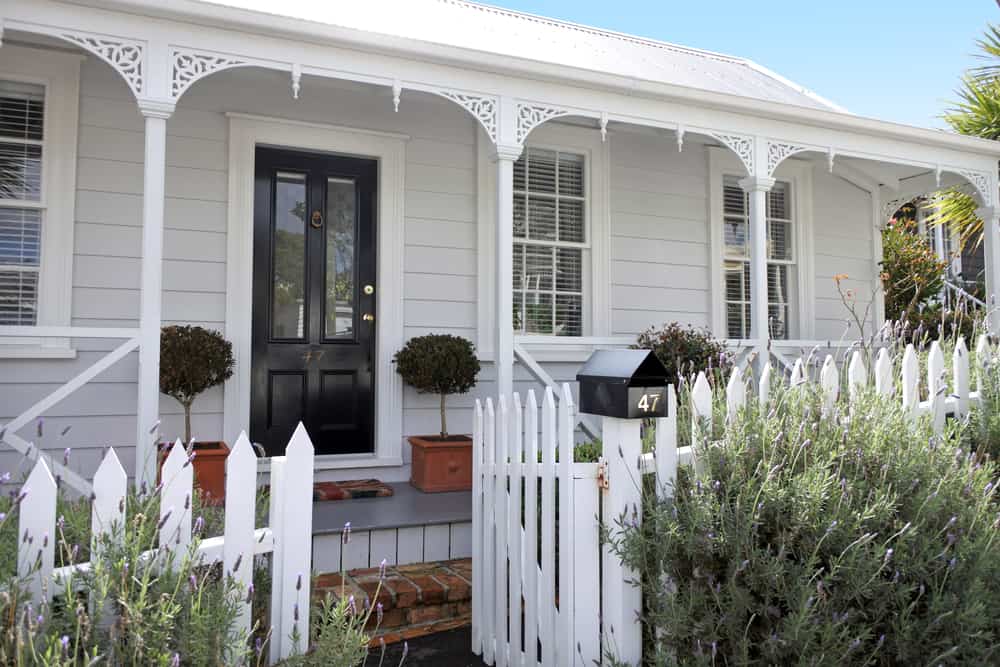
Almost 65% of Kiwis own their own homes. Auckland is by far the most expensive city to live in. The New Zealand government tries to encourage immigrants to live in other cities by giving them an extra 30 points towards their permanent residence point score if they live in another town or city. Property in South Island is cheaper than North Island, probably due to the colder climate. But if you enjoy mountains and skiing, it’s a great and affordable place to live.
Monthly Rental Prices in New Zealand
- 1 bedroom apartment in City Centre: NZ$920 – NZ$ 2,400
- 1 bedroom apartment outside the City Centre: NZ$600 – NZ$ 2,200
- 3 bedroom apartment in City Centre: NZ$1680 – NZ$ 4,300
- 3 bedroom apartment outside the City Centre: NZ$1050 – NZ$ 3,300
- Price per square meter (10.7 square feet) to buy in City Centre: NZ$4000 – NZ$ 15,000
- Price per square meter (10.7 square feet) to buy outside City: NZ$3000 – NZ$ 10,100
New Zealand Housing Cost Comparison
This is how rents in New Zealand compare with other countries around the globe.
United Kingdom is 1.43% more expensive
United States is 74.27% more expensive
Australia is 25.46% more expensive
Singapore is 147.27% more expensive
France is 13.22% cheaper
UAE is 24.37% more expensive
Spain is 26.44% cheaper
Source: Numbeo
How to Save on Housing Costs
- Share an apartment or house. Have a look at the following sites to find your perfect room or flatmate: iRoommates, Roomies, Trade me, NZfalatmates, and Roomgo.
- Different regions – different prices. The housing costs in North and South Island vary considerably. Rotorua is considered the cheapest city to live in, with Auckland’s North Shore being the most expensive. International Citizens have informative information on the best areas to live in New Zealand.
3. New Zealand Food, Grocery, and Restaurant Costs
New Zealand is long way from anywhere so don’t expect a vast array of imported foods or the ability to get your favourite fruit and veg all year round as you can in other countries. Kiwis produce a mouth-watering array of fruit, vegetables, dairy products and, of course for the non-vegetarians/vegans, lamb.
With a 15,000 km coastline you can expect seafood to dominate many restaurant menus. Kiwis enjoy fine dining and have some exceptionally good restaurants all over the country. New Zealand’s excellent wines complement the tasty cuisine.
- Inexpensive Restaurant: NZ$15 – NZ$45
- Takeout Coffee: NZ$4 – NZ$7
- Bottle of Coke: NZ$2.5 – NZ$5
- 1L of milk: NZ$2 – NZ$4
- Loaf of Bread: NZ$1.69 – NZ$5
- 12 Eggs: NZ$3.60 – NZ$9.60
- 1kg Chicken Fillets: NZ$8 – NZ$20
- 1kg Beef: NZ$13 – NZ$32
- 1kg Apples: NZ$2 – NZ$5.99
- 1kg White Rice: NZ$2 – NZ$4.99
This is how restaurants and food prices compare with other major countries in the world.
- UK restaurants are 2.65% cheaper, and groceries are 30.30% cheaper than in New Zealand.
- United States restaurants are 11.53% more expensive, and groceries are 14.71% more expensive than in New Zealand.
- Australian restaurants are 0.34% more expensive, and groceries are 11.21% more expensive than in New Zealand.
- Singapore restaurants are 10.28% cheaper, and groceries are 9.96% more expensive than in New Zealand.
- French restaurants are 0.50% cheaper, and groceries are 3.97% cheaper than in New Zealand.
- UAE restaurants are 10.96% cheaper, and groceries are 23.11% cheaper than in New Zealand.
- Spanish restaurants are 23.06% cheaper, and groceries are 39.94% cheaper than in New Zealand.
Source: Numbeo
Bonus Tips for Cheaper Food, Restaurants, and Groceries
- Know your supermarkets: New Zealand’s seasonal produce is affordable but, a word of warning, buying fresh produce that’s out of season will be exceptionally expensive. Supermarkets are well stocked with everything you’ll need and cater for the many nationalities that live in NZ. There are also excellent health food stores that sell organic foods. Popular supermarkets in New Zealand are Foursquare, Paknsave, New World, Fresh Choice and Count Down.
- Find Cheap Eats:New Zealand isn’t the cheapest place to eat out, but if you hunt around, you will find some good restaurants that offer specials on various days of the week. Have a look at the following sites for suggestions – NZ Pocket Guide, Urbanlist, Tripadvisor and Wanderlog.
4. New Zealand Alcohol Costs
Kiwis enjoy a tipple; whether it’s a barbie after the rugby or a quiet evening at home, alcohol is seen as sociable and relaxing. Alcohol is reasonably priced but the NZ government is talking about putting up the tax on alcohol again to try and deter people from drinking.
- Bottle of imported beer at a restaurant/pub: NZ$8.00 – NZ$12.77
- Pint (0.5L) domestic beer at a restaurant/pub: NZ$6.00 – NZ$12.00
- Pint (0.5L) domestic beer at a supermarket: NZ$2.50 – NZ$9.00
- Bottle of imported beer at a supermarket: NZ$2.00 – NZ$10.00
- Mid-range bottle of wine at a supermarket: NZ$12.00 – NZ$25.00
How to drink for less in New Zealand
- Keep an eye on the local papers and flyers for cheap drinks in supermarkets, bars, clubs, and restaurants.
- Use bulk discount websites to find cheap cost alcohol – 1-day.co.NZ, and Grab one
- Use some specific websites to find the best prices on particular alcohol – Wine Searcher, and Drink Spy
- Many bars and restaurants have Happy Hour specials after work, usually from 4 pm to 7 pm. Have a look at the following sites for more tips on where to go to save money on a night out – Urbanlist, Trip Advisor Talulah, Everybody’s, and Gusto at the Grand.
5. New Zealand Transportation Fares
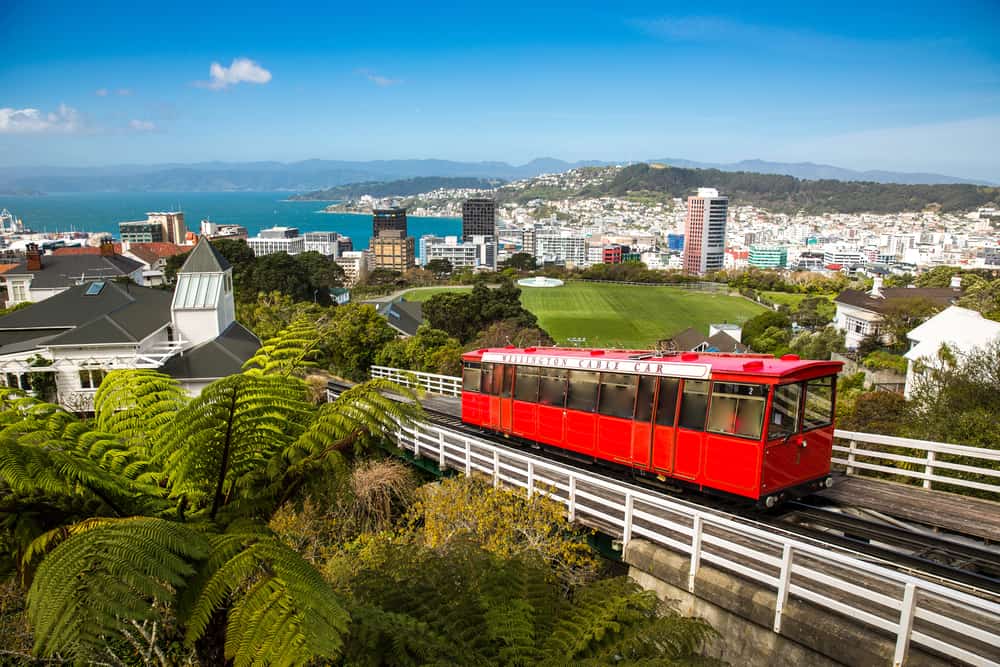
Every New Zealand city has a good public transport system. Wellington and Auckland have metro rail services, as well as buses, trains and ferries. Transport in rural areas is not so great and it’s generally advisable to drive yourself.
Here are some example ticket costs.
- Adult Single – NZ$2.40 – NZ$5.00
- Monthly season ticket, unlimited – NZ$100.00 – NZ$220.00
- Taxi Start (normal tariff) – NZ$2.60 – NZ$5.00
- Taxi 1km (normal tariff) – NZ$50.00 – NZ$78.00
How to save money on public transport
- Combining different transport options such as driving to the nearest station, parking a vehicle there and completing the journey using public transport
- Buy a bike and make use of the cycle lanes
- Walk to work
6. Cost of Internet in New Zealand
New Zealand offers the world’s 20th fastest internet speed (85.95Mbps) but it’s more expensive compared to the other developed countries in the world.
- Vodafone– NZ$8./mo for an unlimited plan
- MyRepublic – NZ$00/mo for 300 Mbps (fiber optic)
7. Cost of Clothing, Personal Items, Gym, and Leisure
North and South Island have different weather patterns. South Island’s west coast is the wettest part of New Zealand. The average rainfall is between 600mm and 1,600mm per annum, although the rainfall can go up to 10,000mm in the mountains of South Island.
North Island has a mild climate with a mean average temperature of 16C. South Island’s mean annual temperature is 10C. New Zealand certainly isn’t short of sunshine, with an average of 2,000 hours annually. For those who enjoy snow, South Island has snow every year and is popular with Kiwis who enjoy skiing and snowboarding.
Here are some clothing prices, together with other useful prices.
- Pair of Jeans: NZ$50.00 – NZ$150.00
- Summer Dress: NZ$30.00 – NZ$105.00
- Running Shoes (Trainers): NZ$100.00 – NZ$200.00
- Business Shoes: NZ$90.00 – NZ$250.00
- Short Doctor’s visit (15 mins): NZ$59.00
- Deodorant: NZ$5.43
- Shampoo: NZ$7.00
- Toilet Paper (4 rolls): NZ$3.46
- Gym membership: NZ$27.00 – NZ$100.00 per month
- Movie (cinema) ticket: NZ$15.00 – NZ$22.50
Source: Numbeo and Expatistan
8. Cost of Owning a Car and Driving a Car in New Zealand
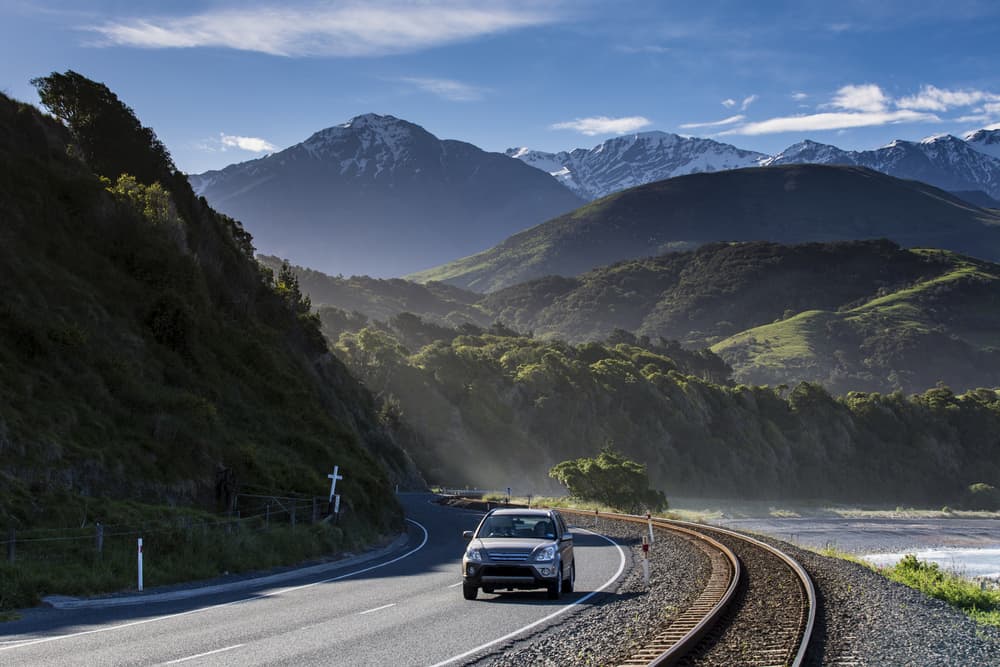
New Zealand has a good road network and, when travelling in rural areas, you can drive for hours without seeing another vehicle. However, the cities of New Zealand are subject to the same traffic jams as every other country in the world.
An overseas driving licence can be used for 12 months in New Zealand. After 12 months of living in New Zealand, you need a New Zealand driving licence. Buying a car is a fairly easy process and saves on car hire costs.
Here are some other sample costs of owning and operating a car in New Zealand:
- Volkswagen Golf:NZ$38,000
- 1 liter (¼ gallon) of gas (petrol):NZ$2.63 – NZ$3.12
- Other fees (if any):The average cost of owning and running a car in New Zealand is NZ$14,000 per annum
Source: Numbeo, NZ Government
Ways to save money driving in New Zealand
- Car sharing or pooling is one way to save money. Try Carpoolworld, NZ Pocket Guide, Link
- Taxis can sometimes be a cheaper option, especially if you are going to have to park all day. Try NZ Cabs, Uber, New Zealand Cabs, and Alert Taxi
Need your car/vehicle moved to Canada? Then read our guide to Car Transport & Vehicle Shipping
9. Taxes in New Zealand
Kiwis’ tax rates are reasonable. Individuals pay 10.5% on income up to NZ$14,000. Individuals who earn between NZ$14,001 – NZ$48,000 pay 17.5% tax. If you earn between NZ$48,001 – NZ$70,000, you pay 30% tax. Over NZ$70,000 you may 33% tax. To learn more about the New Zealand tax system, go to New Zealand Taxation Guide.
Sales tax (VAT) in New Zealand is 15%. Sales tax is always included in the price you see in store or online.
One of the joys of living in New Zealand is there’s no capital gains tax. Learn more about property tax in New Zealand here.
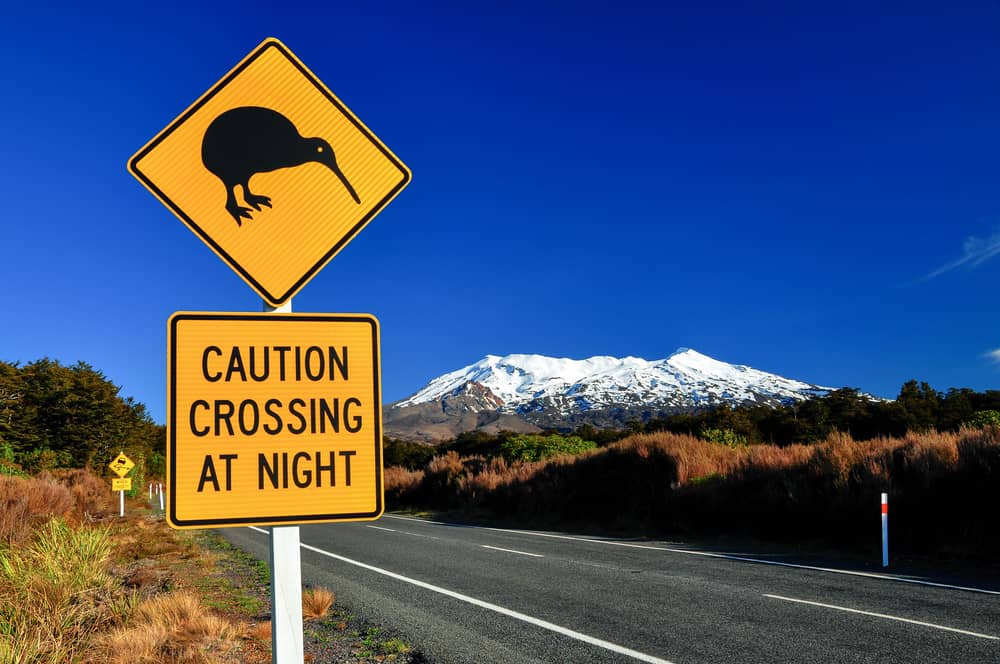
10. Flight Costs from New Zealand
If you do make a move to New Zealand, here’s how much it will cost to fly to other major world cities from Wellington based on the lowest one-way fares from Skyscanner as of late 2022:
- London: NZ$848
- Paris: NZ$829
- New York: NZ$699
- Los Angeles: NZ$588
- Dubai: NZ$905
- Sydney: NZ$956
- Melbourne: NZ$970
- Cape Town: NZ$820
- Hong Kong: NZ$780
Other New Zealand Relocation Tips
The costs and pricing above should give you a good idea of the cost of living in New Zealand, but perhaps the following extra tips will make your move go smoothly.
11. Relocating to New Zealand Alone
Moving is always stressful, but moving on your own can be exceptionally difficult. However, New Zealand is a wonderful country that warmly welcomes newcomers. In a recent survey, nine out of ten new immigrants to New Zealand said they were delighted with their decision to move countries.
- Meetups:New Zealand has many Meetup groups covering a wide range of activities including watersport, sports events, cycling, skiing, hiking and so much more.
- Attend local events: New Zealand has a great arts scene hosting a variety of festivals, concerts, and events. Have a look at the following sites for inspiration – Eventfinda, Holidify, Wildfood, Queenstown Winterfestival, and Coast to Coast.
12. Moving to New Zealand with a Family
New Zealand is one of the world’s safest countries and has a great education and healthcare system. It’s a country that understands the importance of following a balanced work and home lifestyle. The HSBC Expat Explorer survey quoted New Zealand as the ideal destination for raising a family.
- New parents (or parents to be):Check out Real Parent, Plunket, Parent to Parent, and Parent Center for advice, courses and ways to meet other parents or parents to be.
- Live in a family-friendly area:Everywhere in New Zealand is family-friendly. The whole country is safe and welcomes families. Find suggestions for the best family-friendly area
- Find things to do with the kids:New Zealand has so much from children to do. Watersports, hiking, cycling and winter sports are top of the list. The country’s climate and spectular scenery offers so much for families. Have a look at the following website for inspiration – 100%purenewzealand, Trip Advisor, Rotorua , Wetaworkshop, and Zealandia
13. Moving to New Zealand for Work
Moving to a new country for work is one of the most common reasons people choose to move. While it is possible to move without a job, it makes sense to ensure there are jobs in your field before you make a move.
New Zealand’s economy is ranked 2nd in the Asia Pacific, making it a great country to work in. Farming, both animal and agriculture, is an important industry in New Zealand. Paper production and timber are also high on the list. Skilled and experienced people are sought after, especially engineers, teachers, medical professionals, tradesmen and those working in hospitality.
Here are a few things to consider when moving for work:
- Salary:Most individuals earn NZ$40,000 – NZ$80,000 per year. Check salary ranges on sites such as Glassdoor and Govt.NZ, and Payscale.
- How to find work: If you want to have a job lined up before you move to New Zealand but aren’t sure where to begin, the following sites are good places to start: Trademe, Silverstripe, Jobrapido, and Seek. You can also Google recruiters in your industry, as they can often help land you some initial interviews.
14. Moving to New Zealand from Australia
Australian residents and permanent residents can work, study, and visit New Zealand without applying for a visa, so for Aussies it’s an easy move. If you are thinking of moving from Australia to New Zealand, here are a few things to consider.
- Size comparison:Australia is 29 times larger than New Zealand. The population of Australia (20.5 million) is four times higher than New Zealand (5 million).
- Join expat groups:Meetup, Internations, and Facebook offer ways of meeting up with other Australians in New Zealand.
15. Moving to New Zealand from the United States
There are over 16,000 American citizens living in New Zealand. One American described New Zealand as ‘a peaceful paradise in the corner of world’ which really sums up the landscape and the Kiwis in just a few words.
- Size: the United States is 3,558% larger than New Zealand. The US has a population of 327 million compared with New Zealand’s 5.084 million.
- Expat groups:Meeting up with fellow Americans helps the moving process to go smoothly. Link up through sites such as Internations, American club Auckland, Facebook, and Meetup.
16. Moving to New Zealand from the United Kingdom
UK citizens can visit New Zealand for six months. Brits definitely feel at home here and it’s estimated that 80% of Kiwis have some British ancestry.
- Size: New Zealand is 10% larger than the UK but only has a population just over 5 million people compared with the UK’s 67.88 million.
- Expat groups: If you want to get together with others from the UK who enjoy everything New Zealand offers, then go to Internations and Meetup.
Hopefully, the tips and costs above are helpful. If you want to start pricing out how much it will cost to move to New Zealand, you can start by comparing moving quotes here.
Guides to moving and living in other countries around the globe